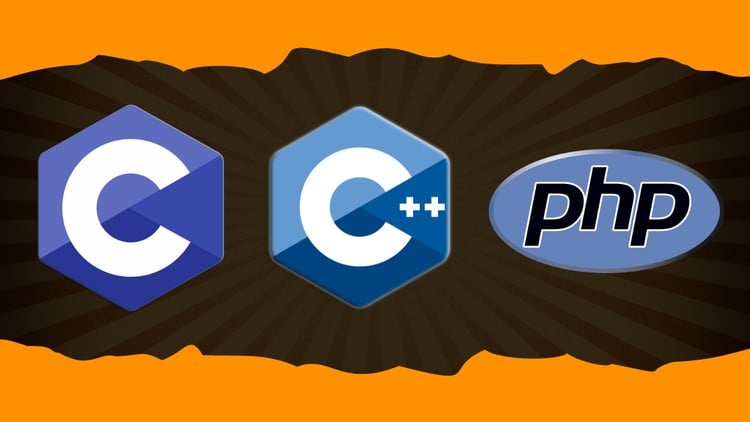
Learn to Build Robust Applications by Full Spectrum of Programming in C, C++, and PHP, from Basics to Advanced Technique
⏱️ Length: 5.3 total hours
⭐ 4.34/5 rating
👥 12,742 students
🔄 May 2025 update
Add-On Information:
Note➛ Make sure your 𝐔𝐝𝐞𝐦𝐲 cart has only this course you're going to enroll it now, Remove all other courses from the 𝐔𝐝𝐞𝐦𝐲 cart before Enrolling!
- Course Overview
- Deceptively titled ‘None’, this intensive course offers a full-spectrum journey into building robust applications using C, C++, and PHP. It’s meticulously designed to take learners from foundational programming concepts to advanced architectural techniques, providing a comprehensive understanding of these three critical languages. The curriculum emphasizes practical application, ensuring theoretical knowledge is immediately reinforced through hands-on coding challenges. Students will learn to harness each language’s distinct strengths – from C/C++’s system-level performance to PHP’s dynamic web development capabilities. With its May 2025 update, the course guarantees contemporary relevance, aligning with the latest industry standards and best practices, making it an indispensable resource for cultivating versatile and highly skilled software engineers.
- Requirements / Prerequisites
- A fundamental understanding of programming logic and basic computational thinking is highly recommended. While the course initiates from basics, prior exposure to any programming language will significantly ease the learning curve, allowing a deeper focus on the specific intricacies of C, C++, and PHP.
- Familiarity with essential computer operations, including file system navigation and command-line interfaces, will prove beneficial. This background supports managing C/C++ compilation processes and interacting effectively with PHP server environments.
- Participants should possess a strong commitment to consistent practice, active engagement with the material, and a proactive approach to self-study. Mastering the breadth and depth of three distinct languages requires dedicated effort beyond the core curriculum.
- Access to a personal computer (Windows, macOS, or Linux) and a stable internet connection is mandatory. The system needs to support modern development tools, including C/C++ compilers (e.g., GCC) and local web server setups for PHP (e.g., XAMPP, Dockerized environments).
- Skills Covered / Tools Used
- Core C Programming: Develop mastery in C syntax, data types, control structures, functions, pointers, dynamic memory management (malloc/free), arrays, strings, structures, file I/O, and preprocessor directives for efficient, low-level system interactions.
- Object-Oriented C++: Gain comprehensive understanding of C++ fundamentals including classes, objects, encapsulation, inheritance, polymorphism, virtual functions, templates, the Standard Template Library (STL), exception handling, and advanced OOP design principles for modular software development.
- Web Development with PHP: Achieve proficiency in PHP syntax, server-side scripting, handling HTTP requests, forms processing, robust database interaction (MySQLi/PDO), session management, implementing crucial security best practices (e.g., preventing SQL injection, XSS), and introduction to web architectural patterns.
- Robust Application Design: Acquire principles of defensive programming, comprehensive error handling strategies across C, C++, and PHP, secure coding practices, input validation, architectural patterns for scalability and maintainability, performance optimization, and foundational testing methodologies.
- Development Ecosystems: Practical experience using C/C++ compilers (e.g., GCC/Clang), popular Integrated Development Environments (IDEs) like VS Code, debugging tools, fundamental version control (Git), and setting up local web server environments (Apache/Nginx with PHP-FPM).
- Essential Data Structures & Algorithms: Implement and apply core data structures (linked lists, stacks, queues, trees, hash tables) and algorithms effectively using C/C++ to solve complex computational problems, strengthening analytical and problem-solving foundations.
- Benefits / Outcomes
- Highly Versatile Developer Profile: Acquire a unique and powerful skill set spanning low-level system programming, high-performance computing, and dynamic web application development, ensuring exceptional adaptability across diverse technical roles and project demands.
- Proficiency in Robust Software Engineering: Develop the expertise to design, build, and deploy applications that are inherently secure, efficient, maintainable, and resilient to real-world failures, aligning with rigorous professional industry standards.
- Enhanced Problem-Solving Acuity: Significantly sharpen analytical thinking, logical reasoning, and debugging capabilities through rigorous engagement with multi-paradigm programming challenges, fostering innovative and independent problem ownership.
- Increased Career Opportunities: Substantially boost marketability in the competitive tech sector with strong command over C, C++, and PHP, opening doors to high-demand roles in system programming, backend engineering, web development, and enterprise software.
- Confidence in Complex Project Execution: Gain the practical confidence to independently architect, implement, and manage sophisticated software solutions, transitioning beyond basic tutorial-following to genuine innovation and comprehensive project delivery.
- Strong Foundation for Specialization: Establish a robust and comprehensive technical base, providing an excellent springboard for future specialization in advanced areas like embedded systems, game development, operating systems, or enterprise cloud solutions.
- PROS
- Exceptional Breadth: Uniquely covers C, C++, and PHP, offering a rare full-spectrum view from low-level systems to high-level web development, maximizing versatility.
- Real-World Robustness Focus: Directly addresses critical industry needs by emphasizing secure, stable, and performant application development.
- High Learner Satisfaction: A strong 4.34/5 rating from over 12,000 students attests to the course’s quality and effective learning experience.
- Contemporary Relevance: The May 2025 update ensures the curriculum aligns with modern programming practices, tools, and evolving industry trends.
- Structured Progression: Expertly guides learners from fundamentals to advanced techniques, making complex topics accessible for a wide audience.
- CONS
- Demanding Time Commitment: While exceptionally structured, effectively mastering three distinct and powerful languages alongside robust application design principles requires substantial dedication, consistent practice, and extensive self-study far exceeding the stated 5.3 hours. True proficiency demands significant personal time investment.
Learning Tracks: English,Development,Programming Languages
Found It Free? Share It Fast!